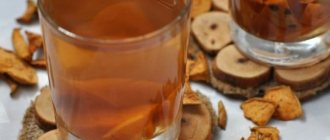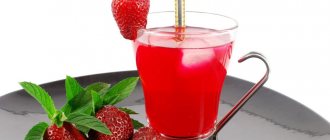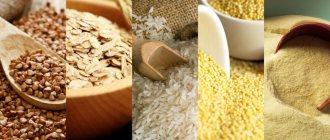Can a nursing mother have sugar?
Is it okay to have sugar while breastfeeding? The answer is clear: it depends on the volume. Consumption in small quantities does not pose a significant threat to either mother or baby. You can allow yourself to drink a cup of tea by adding a teaspoon of sugar; besides, this promotes lactation. In limited quantities you can have dark chocolate (but not earlier than the baby is 6 months old), marshmallows, marshmallows, kozinaki, biscuits and oatmeal cookies, halva, dried fruits, homemade jam, natural (non-allergenic) juices. When breastfeeding, you should avoid consuming sweets with dyes, milk and white chocolate, pastries and cakes with fatty creams, and packaged juices.
Important! It is prohibited to consume sweet drinks with gas, they will negatively affect the baby’s digestive system, kidneys, liver and heart.
A separate issue is consumption in the first month. Is it possible to have sugar while breastfeeding during this period?
- For Mom. Gynecologists recommend avoiding consumption of this product. This is a period of hormonal changes in a woman, and after childbirth the vaginal microflora is disrupted and immunity is reduced. Excessive consumption of sweets contributes to the development of thrush.
- For a newborn. The baby’s poorly developed digestive system is not able to withstand such a load, so fermentation in the intestines, bloating and colic occur.
From what month is it included in the diet?
A nursing mother can consume sweets immediately after giving birth. You can also replace regular sugar with cane sugar, and be sure to include fruits and vegetables in your diet.
In any form?
You can't eat a lot of sweets. If you really want to, a nursing mother can eat the following foods:
- marshmallows (without chocolate);
- oriental sweets;
- honey;
- only dark and natural chocolate (do not add too much);
- Biscuits can be unleavened or oatmeal;
- cane sugar;
- candied fruits and marshmallows;
- natural marmalade.
Required in the diet:
- dried fruits and compotes made from them (raisins, dried apricots, dates, prunes);
- fruits (pears, apples, bananas).
ATTENTION! To avoid colic in infants, do not get carried away with sugar and sweet foods. With an excess of sweets in the diet, the immune system is depressed, the membranes of the teeth deteriorate and rashes appear on the skin.
Benefit
About the benefits of sugar in a nursing diet. Regular sugar (sucrose) is a pure carbohydrate and a nutritious food. The body receives energy from sugar and is saturated with serotonin (the hormone of happiness). Useful functions from sweets:
- invigorates and restores strength;
- improves mood and helps cope with postpartum depression;
- relieves spasms and pain;
- brings sleep back to normal;
- helps in the absorption of vitamins, calcium and iron;
- participates in the construction of brain cells.
Why do mothers have concerns when breastfeeding?
By the time of pregnancy and childbirth, women suffering from diabetes are able to control their disease, but the onset of lactation often coincides with the appearance of so-called “maternal melancholy” (postpartum depression) in a young mother. In this regard, there are concerns about how this pathology can affect the health of the baby.
Many mothers, knowing about the autoimmune nature of the disease, think that with diabetes mellitus, antibodies are produced in the blood of a nursing woman, which can enter the baby’s body with milk and provoke the occurrence of this pathology in the child - this is a myth and misconception. Diabetes mellitus is a hereditary disease associated with a defect in certain genes; there is a risk of its development in babies, but breastfeeding protects the newborn and infants from the likelihood of its occurrence.
Long-term breastfeeding (at least up to six months of age) makes it possible to fully mature all organs of the digestive tract, including the endocrine zone of the pancreas. In addition, breastfeeding is considered one of the preventive measures for the development of paratrophy and obesity in the future, which also affects the occurrence of diabetes mellitus in schoolchildren and adolescents.
Breastfeeding with diabetes protects the baby from the occurrence of this pathology in the future
Is there any benefit from sugar for breastfeeding women?
Despite the fact that sweets are harmful in large quantities, with moderate consumption they will have a positive effect:
- provides the body with energy and a feeling of vigor;
- helps restore strength during physical and emotional stress;
- improves psychological state, helps eliminate depression;
- softens the negative impact of toxins on the liver;
- improves sleep, relieves insomnia;
- promotes the absorption of B vitamins, calcium and iron;
- activates brain activity.
Some sugar elements, in particular fructose and glucose, are important for infants and promote growth and development. It is impossible to completely exclude sweets from the menu when breastfeeding, since they supply the necessary energy to the body.
Harm
A lot of sweets in the diet of a child and a nursing mother negatively affects both organisms:
- Excess negatively affects the intestinal microflora, causing gas formation, fermentation, and disrupts stool. For a child, this has a detrimental effect on the intestines, which will further affect the ability of digestion.
- Another negative factor is the high calorie content - the baby will eat a smaller amount of sweetened porridge, but there will be little satiety, and he will want to eat earlier. Such nutrition will lead to excess weight, energy will not be spent on vigorous activity in a timely manner, and its excess will accumulate in the form of fat reserves.
- For the nervous system. If for a mother this is a great way to cope with depression and cheer herself up, then for an infant, sweets become stimulants and irritants. As a result, the baby falls asleep poorly and has restless sleep. In special situations, hysteria and aggression may be added.
- Also, an excess of sweets has a bad effect on the absorption of vitamins. This leads to the development of caries, washes out calcium - which leads to early loss of baby teeth.
- For immunity, it decreases and becomes weakened.
We recommend reading: Is it possible to eat avocado during breastfeeding: benefits, harm, recipes
Allergy to sugar
The child’s body may react negatively to the glucose contained in sugar. Your child may experience redness and peeling in the following areas:
- in the groin;
- on the cheeks;
- on the elbows.
The child’s body may react negatively to the glucose contained in sugar
A negative reaction to sugar in an infant can manifest itself in the form of colic. When they occur, the child pulls his legs to his chest and behaves restlessly.
Arguments for refusing or using sugar substitutes for breastfeeding
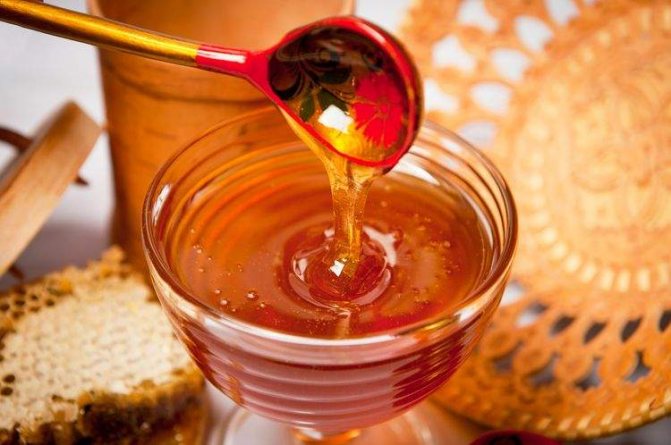
When adding sugar substitutes to a young mother’s diet, first of all it is worth assessing all the risks and their impact on the small child. For example, harmless and healthy honey can become a source of allergic reaction. Potentially hazardous foods should be introduced into the diet gradually.
Synthetic sweeteners only benefit the mother; consuming them allows you not to limit yourself to sweets and control your weight. But, in addition to the obvious positive aspects, they can have a negative impact on the health of the mother and child. Some, for example, xylitol, have a strong laxative effect when the daily norm is increased.
Sugar substitutes and why they are dangerous
When breastfeeding, you can use sweeteners:
- The most common is fructose . It is natural and twice as sweet as sugar, with the same calorie content. Easily digestible and suitable for diets.
- Sorbitol is a reduced glucose sweetener. Its high content in pears and apples, peaches can cause fermentation in the intestines, bloating and colic.
- Stevia is an herb that is suitable even for pregnant women. Calorie-free, natural sweetener from the plant of the same name. Leaves a specific “herbal” taste. There are no contraindications for use.
- Erythritol is a natural, calorie-free sugar substitute. Does not cause caries or skin rashes, and is not as sweet as fructose. Not harmful if you overeat.
- Sucralose, aspartame, saccharin are chemical substitutes. They are four hundred times or more sweeter than sugar. Do not use for cooking or boiling. May be harmful if overeated.
IMPORTANT! The danger of sweeteners is that overeating them can cause skin diseases and intestinal disorders. Many substances are of chemical origin, which is why it is worth limiting or avoiding their use. Particular attention should be paid to the amount of substance consumed.
Features of use during hepatitis B
Sugar is acceptable in the diet of a nursing mother. Pediatricians have determined the minimum norm - 40 grams per day. But, if there is no tendency to allergies and diathesis, then you can increase it. This is individual for each mother and child.
How much is acceptable?
Doctors allow you to eat about 40 grams of sugar per day, about 300 grams per week. In order not to get confused where how much is, you can prepare unleavened compotes and porridges and sweeten them separately. If mom drinks tea with sweets, it is advisable not to add sugar. The drink should be sweetened after preparation: cocoa, compotes (you don’t need to add sugar at all), tea.
Can it be added to tea?
A nursing mother can drink tea with sugar (you should limit yourself to 1-2 spoons per glass); the child should not sweeten drinks. One or two cups a day will not harm either mother or child.
A hot drink has a beneficial effect on milk flow. In the evening you should not drink tea - it will act as a stimulant for the child and prevent him from falling asleep.
Which ones to use? When to introduce it into the diet?
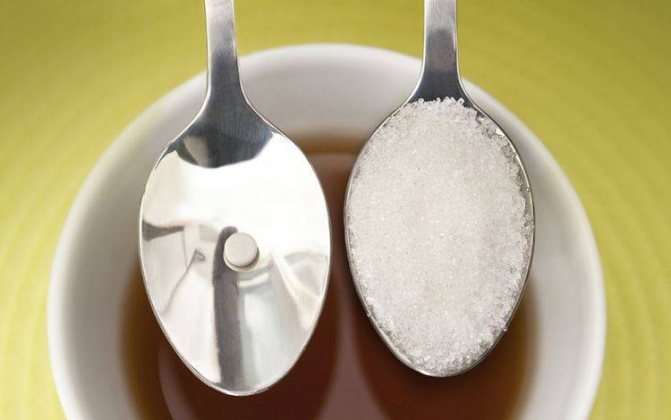
Most pediatricians and gynecologists advise following a strict diet in the first months of breastfeeding. By following it, it will help the baby adapt to a new way of eating, and the mother will quickly return to her previous form. After the diet, doctors allow you to expand your diet and introduce some food groups.
To maintain metabolic processes, glucose levels and good mood, it is recommended to start consuming fast carbohydrates. But they should be introduced with caution, because new products can affect the baby’s well-being, and exceeding the daily intake can negatively affect the mother’s figure.
The most affordable option is beet (white) sugar, but its calorie content is high and there are no nutrients in it. Therefore, doctors offer an alternative - a sugar substitute. There are several options for this product:
- sweet foods, for example, honey, molasses;
- brown or coconut sugar;
- fructose.
- sorbitol;
- xylitol;
- sodium cyclamate;
- stevioside and others.
How can you replace white sugar during lactation?
Some people argue that there are many healthy alternatives to regular white sugar. Let's look at the most popular ones.
Cane sugar
Cane sugar is obtained from sugar cane. This is a raw (unrefined) product. It has several varieties:
- demerra;
- cassonade;
- turbinado;
- muscovado;
- black Barbados.
Brown sugar is 3 times more expensive than regular white sugar, since all its varieties are produced in exotic countries. This type of sugar is as harmful to health as white sugar. But due to the fact that it is purified, trace elements are retained in it:
- zinc;
- iron;
- phosphorus;
- magnesium.
White and brown sugar have approximately the same calorie content - 400 kcal per 100 grams of product. White sugar consists almost entirely of carbohydrates (98%), with the remaining 2% being sodium and calcium. Brown sugar contains 96% carbohydrates, and its additional composition was described above.
Brown sugar contains 96% carbohydrates
During breastfeeding, the doctor recommended that I use cane sugar in my food. She said that it is healthier for adult children than white. This may be true, but it costs more, and the taste is no different from white. At the same time, it contains only 3% more nutrients than regular white, so I still ate my usual refined pieces.
Video: how to choose cane sugar
Fructose
Fructose is a natural sugar found in some fruits and vegetables. It has a number of advantages compared to others:
- Low calorie content: when consuming it, a nursing woman does not have to worry about adding new kilograms.
- Safety for tooth enamel.
- Low allergenicity, ability to enhance immunity.
- Compared to sucrose, it has a sweeter taste, so when it is consumed, it quickly saturates.
- Does not cause fluctuations in blood sugar, which is very important for diabetes.
Fructose is ideal for making sweet desserts (jams, preserves), which will retain freshness for a long time due to the good moisture retention of this type of sugar.
We recommend reading: Salads for breastfeeding
Fructose is ideal for preparing sweet desserts (jams, preserves), which will retain freshness for a long time due to the good moisture retention of this type of sugar.
Ready-made fructose is sold in the store. It can also be obtained with berries and fruits. Fructose is contained in honey, so if this product does not cause allergies in the baby, then it can easily replace sugar. A nursing mother should also take into account the negative effects of fructose:
- Consumption of more than 30 g of product per day can provoke disturbances in the functioning of the cardiovascular system, acid-base balance, and liver.
- Excessive consumption of fructose is dangerous if you have diabetes.
- The components of fructose are well absorbed by the body, so after a short period the woman feels hungry again.
The calorie content of fructose is 399 kcal per 100 grams of product. It contains 98% carbohydrates.
Where does fructose come from?
The most common and well-known natural sweetener today is fructose. How is it produced? Although this sweetener is a natural product, it is rarely found in free form in nature. This species can only be isolated from Jerusalem artichoke fruits and dahlia tubers. They are used to make sweetener in laboratory conditions. The fruits and tubers are boiled, mixed with sulfuric acid, and then the water is evaporated, thus producing fructose crystals. Most often, fruit sugar is found in bound form; it is inseparable from other substances. This is a more difficult way to obtain sweetener. In production, sucrose is broken down using chemical reactions and two independent substances are obtained: fructose and glucose.
Beneficial features
Nursing mothers have to adhere to a certain diet, the severity of which depends on the age of the baby, the maturity of its digestive system and predisposition to allergies.
Sugar from food passes into breast milk; its excess is dangerous for the baby because:
- causes fermentation in the intestines, increased gas formation, bloating;
- disrupts the functioning of the endocrine system;
- destroys the enamel of children's teeth.
For this reason, it is recommended to limit the consumption of sweets and other sugar-containing foods while breastfeeding. Artificial sweeteners are also contraindicated - they can be toxic, cause allergies, and negatively affect the growth and development of the baby. Natural fructose, extracted from fruits and berries, is one of the safest sweeteners.
If a nursing mother has an unbearable craving for sweets, she can be advised to eat some fructose-based jam or preserves made from foods to which the baby’s body has managed to adapt. By adding this sugar substitute to the dough, you can get fluffy, soft baked goods. Another property of the monosaccharide is its ability to enhance flavors, making dishes with fruits and berries more appetizing.
Fructose gives the body energy, increases resistance to physical and mental stress, reducing fatigue. Using a monosaccharide instead of sugar helps relieve nervous tension and fight stress during the postpartum period.
Since the breakdown of fructose does not involve insulin, replacing sugar with this monosaccharide reduces the load on the pancreas and helps normalize carbohydrate metabolism in the body.
Another advantage of a sweetener is the absence of a negative effect on tooth enamel. Eating sweets will not lead to the formation of plaque on the teeth and the development of caries.
Negative Impact
Fructose is considered a suitable sweetener for nursing mothers who want to improve their figure after childbirth and lose excess weight. This is due to the low calorie content of the monosaccharide compared to regular sugar. However, it is fructose that can lead to obesity if you abuse foods that contain it.
Metabolism of fructose is carried out in the liver, and unclaimed carbohydrates are directly converted into fatty acids, enter the blood and from there into the adipose tissue of the body.
This is why fructose-containing foods should not be consumed during a diet aimed at losing weight. In addition, excess fatty acids in the blood lead to disruption of the cardiovascular system. Abuse of monosaccharide is dangerous for the body.
We recommend reading: Green tea during breastfeeding: is it possible or not?
A nursing mother should avoid products containing artificially produced monosaccharides. Systematic consumption of freshly squeezed juices is also harmful, since the drink does not contain coarse fiber, which slows down the breakdown of carbohydrates - in this case, the bloodstream receives a “load dose” of fructose processing products.
Stevia
Stevia is a sweet herb native to South America. An aqueous sweet extract is produced from it, and the leaves of the plant are used for this. The herb has many types, but honey stevia is the most popular in the industry. It is used to produce food supplements and products intended for people suffering from obesity and diabetes.
This natural sweetener comes in the following forms:
- soluble tablets;
- syrup obtained by boiling an aqueous extract, added to food in drops;
- concentrated powder (stevoside) added to food and drinks at the tip of a knife;
One of the forms of stevia release is concentrated powder. - herbal tea in the form of filter bags, brewed using boiling water.
Stevia products are more expensive than white sugar. However, it has a number of advantages:
- does not raise blood sugar levels;
- helps lower blood pressure;
- normalizes digestion and does not cause heartburn;
- helps strengthen the heart;
- eliminates the development of arthritis and kidney diseases by reducing the concentration of uric acid in the body;
- does not increase weight.
A nursing woman should also take into account the negative effects of the product:
- risk of allergies;
- contraindication for hypotension;
- the possible occurrence of hypoglycemia (a drop in blood glucose levels to a critical level) due to frequent use of the product;
- the appearance of dizziness and nausea, pain and numbness in the muscles due to individual intolerance to the plant.
The calorie content of stevia is 272 kcal per 100 grams of product. It contains 13% carbohydrates.
Healthy sweets
It’s not just sugar that can be sweet, no matter how banal it may sound. And the restriction on candy, baked goods and other sweets is not the biggest sorrow. After all, you always have complete natural sweet foods on hand, filled with a fair amount of vitamins and minerals.
So, if the baby does not have allergic reactions, you can replace sugar with honey (of course, in moderation, because honey contains pollen, a strong allergen). Seasonal fruits will also bring mom a lot of taste pleasures, and most importantly, benefits.
It is worth giving preference to fruits that grow in the area where the young mother lives. It is better to put off exotic fruits and citrus fruits and introduce them into the diet as the child grows older.
Fruits and berries are natural sources of fructose.
Sugar - benefits and harm
White refined sugar is obtained from beet roots. It is a pure carbohydrate that provides us with energy. It does not contain vitamins, minerals or other beneficial substances. In the human digestive tract it is broken down into glucose and fructose and enters the blood. The pancreas produces a special hormone - insulin. It normalizes its level in the blood and distributes it among the cells. And its excess is deposited in the form of hated fat folds on our body. As soon as our blood sugar levels drop, we feel hungry again.
When there is an excess intake of sugar, the pancreas begins to function incorrectly and insulin is not produced in the required quantity. Sugar appears in the blood in large quantities and a dangerous disease occurs - diabetes. Everyone also knows its ability to provoke the development of tooth enamel caries.
Is this product really useful in some way? Yes it is. Glucose, which is a product of the breakdown of sugar, is the main source of nutrition for our brain. It is also necessary for the normal functioning of the liver and its barrier function. Glucose also stimulates the body's production of the hormone of joy - serotonin, which improves mood and stabilizes the emotional state.
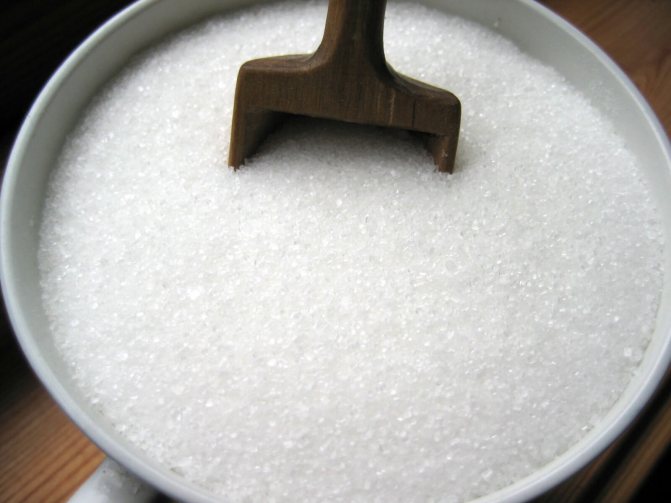
So, we can conclude that sugar is beneficial for humans when consumed in small quantities, in doses. Excessive addiction to this product leads to serious health problems.
Harm of artificial sweeteners
If natural sweeteners can be consumed during lactation, then artificially created ones should be excluded from the menu:
- Aspartame is dangerous because it turns into methyl alcohol. This poison causes poisoning in mother and baby.
- Sorbitol and xylitol cause diarrhea. Abuse of sweeteners leads to urinary tract cancer.
- Suclamate and saccharin are dangerous for the body of women and babies, as they contain toxins.
Artificial sweeteners are poorly excreted from the body, so they accumulate in it and gradually poison it.
Synthetic sweeteners during breastfeeding
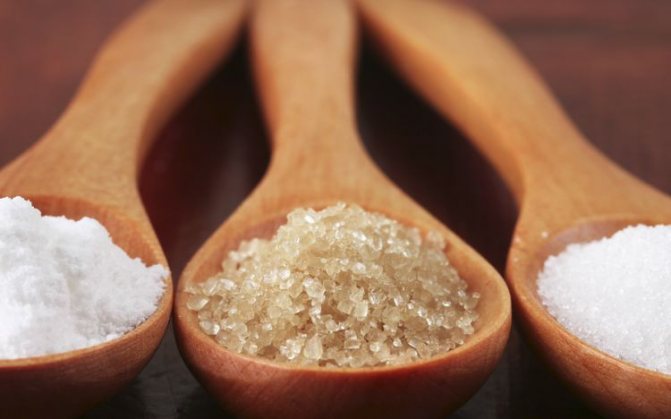
Synthetic sweeteners include those obtained as a result of chemical reactions. This category of products is divided into two more groups.
Low-calorie, i.e. their energy value is lower than that of white sugar. This group includes xylitol and sorbitol.
Xylitol is a common sweetener used in the food industry as additive E967. It can be found in weight loss products or in chewing gum. It is mainly prescribed in complex therapy for the treatment of excess weight and diabetes. If a young mother suffers from these diseases, then she should get the necessary advice from a specialist on whether the sweetener xylitol can be used while maintaining breastfeeding.
Recipes for sweets made from natural sweeteners
Natural sugar substitutes are available for women who are breastfeeding. But it is better to replace pure fructose by preparing delicious products from it.
Halva with fructose
The oriental sweet is prepared like this:
- First, grind half a glass of roasted sunflower seeds.
- Pass flour in an amount of 1.5 cups until brown, mix with seeds.
- Make syrup from 1 fruit sugar by adding 700 milliliters of water.
- After 5-10 minutes of boiling over low heat, pour in 150 milliliters of sunflower oil.
- Remove from heat, add mixture of seeds and flour, stir thoroughly.
- Place in a mold and cool for 4 hours.
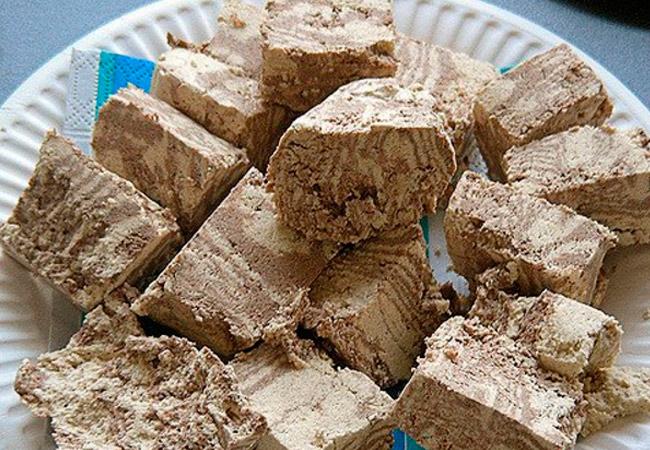
Cut the finished mass and serve it to the table.



